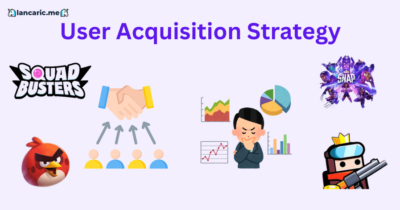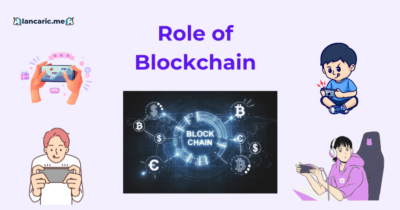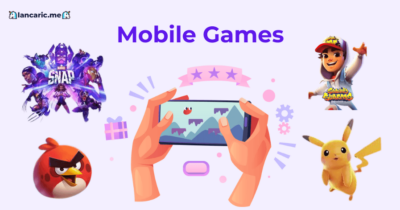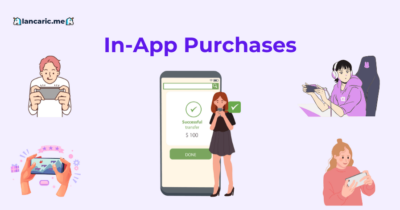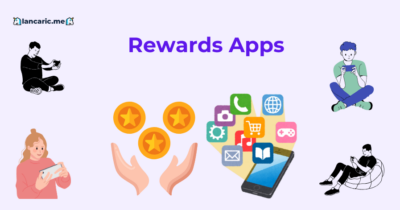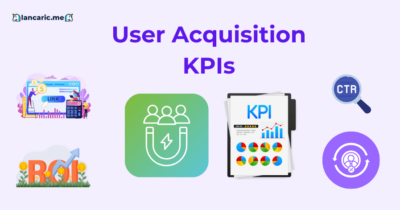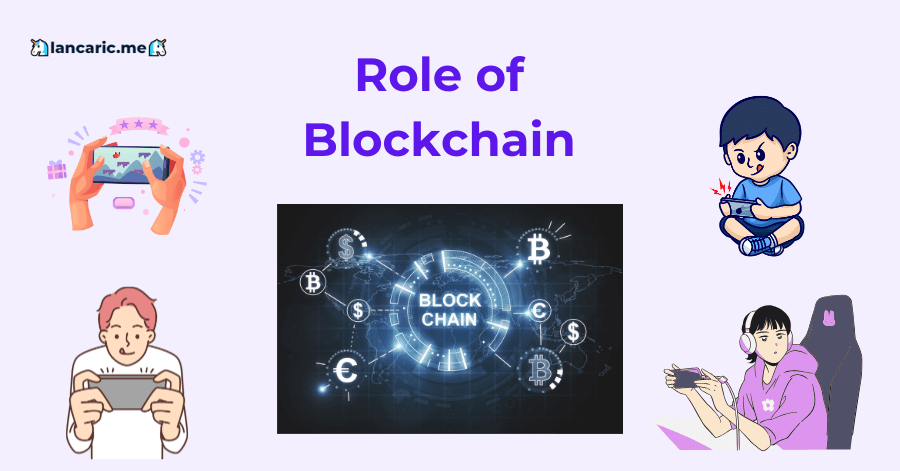
Emerging Role of Blockchain in Mobile Games: Next Big Thing?
The emerging role of blockchain in mobile games is transforming the gaming ecosystem by enhancing security to enable true asset ownership and creating decentralized gaming economies. Blockchain technology ensures transparency and immutability by leveraging distributed ledger systems which prevents tampering and fraud in in-game transactions. The decentralized architecture enables mobile games to incorporate secure peer-to-peer trading of digital assets such as NFTs (Non-Fungible Tokens) and cryptocurrencies to allow players to own, trade and monetize virtual goods.
Blockchain in mobile games enhances user experiences by enabling players to own in-game assets securely. Transparent and secure transactions foster trust. Players earn through play-to-earn models. Interoperability connects diverse game ecosystems. Decentralization empowers gamers with increased control and decision-making.
The best blockchain platforms for mobile games include Axie Infinity, The Sandbox, Decentraland, Mythical Games, Sky Mavis, Upland, Dapper Labs, Gods Unchained, Splinterlands, Alien Worlds, Horizon Blockchain Games, Immutable, Sorare, Guild of Guardians, Champions Arena, Enjin Pte. Ltd., Ethereum, Farmers World, Gala Games, GalaxyFox, MOBOX, OpenSea, Plant vs Undead.
This guide explores the emerging role of blockchain in mobile games and examines whether blockchain technology could be the next big thing in the gaming industry.
What is the Emerging Role of Blockchain in Mobile Games?
The emerging role of blockchain in mobile games includes enhancing transparency, security and player ownership in mobile games. Blockchain enables decentralized gaming ecosystems, introduces non-fungible tokens (NFTs) for unique assets, facilitates play-to-earn models, ensures secure transactions and supports interoperability.
Blockchain is important for mobile games because the technology fosters trust by ensuring transparent game mechanics through decentralized ledgers. Secure transactions protect digital assets. Player ownership of in-game assets empowers users. Play-to-earn models incentivize engagement. Non-fungible tokens introduce uniqueness in virtual items. Interoperability enhances cross-platform asset utilization. Developers access new revenue streams through tokenized economies.
Is Blockchain the Next Big Thing in Gaming and GameFi?
Yes, blockchain is the next big thing in gaming and GameFi because the technology is revolutionizing gaming and GameFi by enabling decentralized ownership, secure transactions and innovative monetization models. GameFi, combining gaming and decentralized finance, allows players to earn real-world value through play-to-earn mechanics, NFTs and virtual assets. Blockchain enhances transparency and facilitates player-driven economies.
Integrating blockchain technology in gaming platforms supports smart contracts that automate in-game transactions and reward distribution. Developers gain a more secure infrastructure while players enjoy true asset ownership and interoperability across games. The convergence reshapes traditional gaming models, positioning blockchain as a transformative force in GameFi’s evolution.
What are the Advantages of Blockchain in Mobile Games?
The advantages of blockchain in mobile games include enabling secure ownership of in-game assets to ensure transparency and security to allow earnings through play-to-earn opportunities, leveraging cross-platform interoperability for assets and empowering through decentralization while reducing dependence on central authorities.
Let’s discuss each advantage of blockchain in mobile games in detail:
Owns In-Game Assets
In-game assets are digital items within a video game that include virtual goods like weapons, characters or skins which enhance gameplay. Blockchain technology enables players to truly own in-game assets by recording asset ownership on an immutable ledger. Blockchain serves as a decentralized system that guarantees transparency and security of transactions involving digital game assets. Ownership is verified through cryptographic keys that only the asset holder controls, thus ensuring authenticity.
Blockchain-based smart contracts facilitate peer-to-peer trading without intermediaries to reduce transaction costs. The decentralized ledger also ensures that developers alter or delete a player’s assets without consensus. Tokenization of in-game assets turns them into unique, tradable tokens to enhance liquidity. Ownership of in-game assets provides players with autonomy, economic value and the ability to sell or transfer digital assets in a secure environment.
Ensures Transparency and Security
Transparency refers to the openness and accessibility of information and security refers to the protection of data and assets from unauthorized access or malicious activities. Blockchain ensures transparency by maintaining a public, immutable ledger that records all transactions. Each transaction is time-stamped and linked to previous transactions, providing a verifiable audit trail. The decentralized nature of blockchain prevents any single entity from altering records to ensure data integrity. Security is ensured through cryptographic algorithms that protect the data within each block.
Consensus mechanisms such as Proof of Work or Proof of Stake, validate transactions before they are added to the blockchain. Smart contracts automate processes to reduce the risk of human error or manipulation. The combination of transparency and security in blockchain creates a trustworthy environment for asset management and transactions.
Earns Through Play-to-Earn Opportunities
Play-to-earn opportunities refer to gaming models where players earn rewards in the form of digital assets or cryptocurrencies, by participating in gameplay. Blockchain technology supports play-to-earn opportunities by enabling the secure ownership of in-game assets through decentralized ledgers. Players earn digital tokens or cryptocurrencies which are recorded immutably on the blockchain to ensure transparency and authenticity of earnings. Smart contracts facilitate the distribution of rewards based on predefined game conditions, eliminating the need for intermediaries.
Tokenized in-game assets provide liquidity to allow players to trade or sell their earnings on blockchain-based marketplaces. The use of non-fungible tokens (NFTs) allows players to own unique assets that increase in value over time. Blockchain’s security ensures that in-game earnings are protected from fraud or unauthorized modifications.
Leverages Interoperability
Interoperability refers to the ability of different systems, networks or software to communicate and exchange data seamlessly. Blockchain leverages interoperability by facilitating communication between different blockchain networks to enhance the overall ecosystem. Cross-chain protocols enable data and asset transfers between distinct blockchains to ensure smooth interactions. Interoperable blockchain networks allow assets like tokens to move freely, increasing liquidity and usability across multiple platforms.
Decentralized finance (DeFi) platforms benefit from interoperability by aggregating services and assets from different blockchains, expanding financial possibilities. Smart contracts across interoperable networks automate complex operations that involve multiple blockchains, increasing efficiency. Blockchain bridges facilitate secure connections between otherwise isolated ecosystems to ensure data consistency and availability.
Empowers Through Decentralization
Decentralization refers to the distribution of authority, control and decision-making across multiple nodes or entities rather than being concentrated in a single central authority. Blockchain empowers through decentralization by removing the need for centralized intermediaries to allow peer-to-peer transactions. Distributed ledgers maintain identical copies of data across multiple nodes, preventing data tampering and enhancing transparency. The consensus mechanism enables the collective validation of transactions to ensure trust without relying on a single authority.
Decentralized networks increase resilience by reducing vulnerabilities associated with central points of failure. Participants have more control over their data and transactions, fostering autonomy and ownership. Blockchain-based smart contracts execute agreements automatically, minimizing the risk of manipulation and increasing efficiency.
Which Blockchain Platforms are Best for Mobile Games?
The best blockchain platforms for mobile games include Axie Infinity, The Sandbox, Decentraland, Gala Games, MOBOX, Upland, Alien Worlds, Mythical Games, Dapper Labs, Gods Unchained, Splinterlands, Horizon Blockchain Games, Sky Mavis, Immutable, Sorare, Guild of Guardians, Champions Arena and Farmers World.
Here are the details of the blockchain platforms that are best for mobile games:
Axie Infinity
Axie Infinity is a blockchain-based gaming platform that leverages NFTs to offer a unique play-to-earn experience. Players acquire digital pets called Axies which are non-fungible tokens (NFTs) built on the Ethereum blockchain. The Axies engage in battles, breed to create new offspring and complete in-game tasks, facilitating player interaction. Smart contracts record all Axie ownership and transactional data to ensure transparency and security. The integration of the Ronin sidechain enhances scalability to reduce Ethereum gas fees and increase transaction speed. Players earn the platform’s native cryptocurrency, Smooth Love Potion (SLP), through gameplay, fostering economic rewards.
The Sandbox
The Sandbox is a blockchain-based virtual gaming platform that enables players to create, own and monetize gaming experiences. Users acquire LAND which represents digital real estate in the virtual world and utilize that space to build games, environments or experiences. LAND parcels are non-fungible tokens (NFTs) stored on the Ethereum blockchain to ensure ownership verification and scarcity. The Sandbox provides a decentralized ecosystem where players, creators and developers use VoxEdit to design in-game assets. The assets sold or traded using the native cryptocurrency, SAND, facilitate a robust economic model. The integration of smart contracts enables trustless transactions between users to ensure security and transparency.
Decentraland
Decentraland is a blockchain-powered virtual reality platform that allows users to create, experience and monetize content. Users acquire parcels of LAND, represented as non-fungible tokens (NFTs) on the Ethereum blockchain which serve as the foundation for building unique virtual experiences. Each parcel is distinct and verifiably owned through smart contracts to ensure transparency and security of ownership. Decentraland’s Builder tool enables users to design and customize their LAND without any programming knowledge, fostering creative participation. The platform’s native cryptocurrency, MANA is used for transactions within the ecosystem such as purchasing LAND or in-game assets. The marketplace facilitates trading of LAND, items and avatars that contribute to the platform’s vibrant economy.
Mythical Games
Mythical Games is a blockchain-based gaming company focused on creating player-owned economies. Players engage in games where digital assets, represented as non-fungible tokens (NFTs), are collected, customized and traded for real-world value. Mythical Games utilizes the EOSIO blockchain to ensure scalability and low transaction costs to enhance user experience. Smart contracts verify ownership and facilitate secure transactions to support a transparent in-game marketplace. The native cryptocurrency, Myth Token, serves as the medium for in-game purchases, rewards and trading, creating a play-to-earn model. The company’s flagship game, Blankos Block Party, allows players to enjoy a social multiplayer environment while earning NFTs through gameplay.
Sky Mavis
Sky Mavis is a blockchain technology company best known for developing the popular play-to-earn game, Axie Infinity. Players collect and breed digital creatures called Axies which are represented as non-fungible tokens (NFTs) on the Ethereum blockchain. Each Axie is unique and ownership is verified using blockchain-based smart contracts to ensure security and transparency. Sky Mavis has developed the Ronin sidechain which reduces gas fees and increases transaction speed, providing an enhanced user experience. The in-game economy revolves around Smooth Love Potion (SLP) and Axie Infinity Shards (AXS) which serve as the platform’s native cryptocurrencies for rewards, trading and governance. The marketplace allows players to buy, sell or trade Axies, land and other in-game assets, fostering economic activity.
Upland
Upland is a blockchain-based property trading game where players buy, sell and trade virtual real estate mapped to real-world addresses. Each property is represented as a non-fungible token (NFT) on the EOS blockchain to ensure unique ownership and transparency. Players earn UPX, the in-game currency, through property transactions, completing collections and participating in events. The marketplace enables players to trade properties, facilitating economic growth and interaction within the platform. Smart contracts record all property transactions to ensure secure and tamper-proof ownership verification. Upland’s metaverse connects real-world locations with virtual experiences, creating opportunities for players to engage with the game in a contextually relevant manner.
Dapper Labs
Dapper Labs is a blockchain technology company known for creating blockchain-based games and digital collectibles. The platform developed Flow blockchain to support high-performance applications, optimizing scalability and reducing transaction costs for a seamless gaming experience. CryptoKitties, one of Dapper Labs’ flagship games, allows players to collect, breed and trade digital cats, each represented as a non-fungible token (NFT). The use of Flow blockchain ensures secure ownership, fast transactions and low fees to enhance user satisfaction. The in-game economy revolves around the buying, selling and trading of digital assets, driving player engagement. Dapper Labs’ marketplace facilitates the exchange of NFTs, creating a dynamic environment for players to participate economically.
Gods Unchained
Gods Unchained is a blockchain-based trading card game that offers players full ownership of in-game assets. Players collect, trade and battle using unique cards represented as non-fungible tokens (NFTs) on the Ethereum blockchain. Each card’s ownership is verified through smart contracts to ensure security and transparency in transactions. Immutable X, a layer-2 scaling solution is integrated to reduce gas fees and provide fast, efficient transactions to enhance the gaming experience. The game’s native token, GODS is used for governance, in-game purchases and rewards, creating an economically engaging ecosystem. The marketplace allows players to buy, sell and trade their NFT cards, fostering a thriving in-game economy.
Splinterlands
Splinterlands is a blockchain-based collectible card game where players own, trade and battle with digital cards. Each card is represented as a non-fungible token (NFT) on the Hive blockchain to ensure verifiable ownership and scarcity. Players engage in strategic battles using their card collections which are stored securely on the blockchain. The integration of the Hive blockchain provides low transaction fees and fast processing to enhance the overall gaming experience. DEC (Dark Energy Crystals) serves as the in-game currency, used for buying, selling and upgrading cards, creating a robust economic ecosystem. The marketplace allows players to trade cards, participate in tournaments and earn rewards, promoting player engagement.
Alien Worlds
Alien Worlds is a blockchain-based metaverse game where players mine resources, engage in battles and govern digital planets. Players use non-fungible tokens (NFTs) represented as digital assets on the WAX, Binance Smart Chain and Ethereum blockchains to ensure interoperability and ownership verification. Mining tools, weapons and land parcels are utilized by players to earn Trilium (TLM), the game’s native cryptocurrency which is used for in-game purchases and planetary governance. The cross-chain compatibility allows assets to be traded across different blockchains, creating a versatile and dynamic economic ecosystem. Smart contracts manage player transactions and interactions, maintaining security and transparency throughout the gaming experience. The platform’s governance model allows players to stake TLM to participate in decisions, fostering a decentralized community.
Horizon Blockchain Games
Horizon Blockchain Games is a blockchain gaming company known for creating Skyweaver, a trading card game built on blockchain technology. Players collect, trade and battle using digital cards represented as non-fungible tokens (NFTs) on the Ethereum blockchain. Each card’s ownership is securely verified using smart contracts, providing transparency and authenticity in transactions. The game leverages the Sequence wallet which simplifies blockchain interactions, making the user experience seamless for both crypto enthusiasts and new users. The in-game currency, USDC is used for purchasing cards, participating in tournaments and trading, creating an engaging economic ecosystem. The marketplace allows players to buy, sell or trade their digital assets that contribute to a vibrant in-game economy.
Immutable
Immutable is a blockchain gaming platform that leverages Layer-2 scaling solutions to enhance the gaming experience on the Ethereum blockchain. Players engage with games like Gods Unchained where digital cards are represented as non-fungible tokens (NFTs) providing ownership and scarcity. Smart contracts facilitate the transparent trading and ownership verification of the NFTs to ensure security for all transactions. The Immutable X protocol, a Layer-2 solution, allows for gas-free transactions and faster processing to enhance accessibility and reduce barriers for players. The native token, IMX is utilized for staking, governance and rewarding players within the ecosystem, fostering economic engagement. The marketplace enables the buying, selling and trading of in-game assets, promoting a dynamic economic model.
Sorare
Sorare is a blockchain-based fantasy sports game that allows players to collect, trade and manage digital football player cards. Each card is represented as a non-fungible token (NFT) on the Ethereum blockchain to ensure unique ownership and verified scarcity. Players use their cards to create fantasy football teams and compete in tournaments, earning points based on the real-life performance of players. Smart contracts facilitate transparent transactions and secure ownership to enhance player trust in the platform. The native token, ETH is used for purchasing player cards and participating in marketplace activities, driving economic engagement. The Sorare marketplace allows for the buying, selling and trading of digital player cards, promoting active community interaction.
Guild of Guardians
Guild of Guardians is a blockchain-based mobile role-playing game that allows players to build teams of heroes and earn rewards through strategic gameplay. Each hero is represented as a non-fungible token (NFT) on the Ethereum blockchain to ensure unique ownership and provable scarcity. Players engage in dungeon-crawling adventures, battling enemies and completing quests to earn rewards that include in-game items and currencies. The integration of Immutable X as a Layer-2 solution provides gas-free transactions to enhance accessibility and allow players to trade assets without incurring high fees. The in-game economy is supported by Gems, the native token that players use for purchases, upgrades and marketplace transactions. The marketplace enables trading of heroes, items and other NFTs, fostering a dynamic and player-driven economy.
Champions Arena
Champions Arena is a blockchain-based mobile game that features turn-based combat and collectible heroes. Players collect heroes, each represented as a non-fungible token (NFT) on the Polygon blockchain to ensure unique ownership and verified scarcity. Heroes participate in strategic battles and players use them to complete quests, tournaments and player-versus-environment (PvE) missions. Smart contracts facilitate secure and transparent ownership of heroes and in-game transactions, fostering trust within the game ecosystem. The in-game currency arena Tokens is used for purchasing heroes, upgrading abilities and participating in special events, driving economic activity. The marketplace allows players to trade, sell or buy heroes and other assets, promoting active community interaction and economic engagement.
Enjin Pte. Ltd.
Enjin Pte. Ltd. is a blockchain platform that focuses on providing tools for game developers to integrate blockchain technology into their games. Developers use Enjin’s platform to create, manage and distribute in-game assets represented as non-fungible tokens (NFTs) on the Ethereum blockchain to ensure unique ownership and interoperability across games. The Enjin Wallet enables players to store and manage their NFTs, providing a seamless interface for interacting with blockchain-based assets. Smart contracts are used to verify ownership and execute transactions securely to enhance trust and transparency in asset management. The Enjin Coin (ENJ) is the native cryptocurrency, used to back the value of in-game assets and facilitate transactions, driving economic activity within the ecosystem. The Enjin Marketplace allows players to buy, sell and trade NFTs, promoting active engagement across various games.
Ethereum
Ethereum is a decentralized blockchain platform that supports smart contracts and provides the foundation for many blockchain-based mobile games. Game developers use Ethereum to create and deploy in-game assets as non-fungible tokens (NFTs) to ensure unique ownership and asset interoperability. The Ethereum blockchain records all transactions and ownership details, providing transparency and security to both developers and players. Smart contracts facilitate secure interactions, automating game mechanics such as asset transfers, player rewards and in-game purchases. Ether (ETH), the platform’s native cryptocurrency is used for transactions and gas fees to support the economic activities within gaming ecosystems. The wide adoption of Ethereum enables players to buy, sell and trade NFTs across multiple games that contribute to a broader gaming economy.
Farmers World
Farmers World is a blockchain-based farming simulation game that allows players to cultivate crops, raise livestock and manage virtual farms. Players use tools represented as non-fungible tokens (NFTs) on the WAX blockchain to perform in-game activities such as harvesting crops and mining resources. Each tool is uniquely owned and recorded on the blockchain, providing verifiable ownership and enhancing the game’s play-to-earn model. Players earn the native in-game tokens, FWW, FWF and FWG which are used for purchasing tools, expanding farms and completing quests. Smart contracts facilitate secure transactions and ensure transparent asset management, building trust among players. The marketplace allows for trading of NFTs that include tools, livestock and other farm assets that contribute to a player-driven economy.
Gala Games
Gala Games is a blockchain gaming platform that empowers players by giving them control over their in-game assets and governance. Players collect, trade and own in-game items represented as non-fungible tokens (NFTs) on the Ethereum blockchain to ensure unique ownership and asset interoperability. The ecosystem utilizes smart contracts to securely verify ownership and facilitate transactions, promoting transparency in asset management. The platform’s native cryptocurrency, GALA is used for purchasing in-game items to support development and rewarding players, driving economic activity. Gala Games features multiple games includes Town Star and Mirandus where players earn rewards by participating in various activities. The marketplace provides a venue for players to buy, sell and trade NFTs, fostering an active player-driven economy.
GalaxyFox
GalaxyFox is a blockchain-based mobile gaming platform that combines space exploration with strategic gameplay and digital asset ownership. Players control fleets, explore galaxies and collect resources, represented as non-fungible tokens (NFTs) on the Binance Smart Chain to ensure unique ownership and verifiable scarcity. Fleets, ships and resources are assets that are upgraded, traded and owned, providing an immersive play-to-earn model. Smart contracts facilitate secure and transparent transactions to ensure players’ assets are protected while fostering trust. The platform’s native token, FOX is used for purchasing in-game assets, upgrading ships and participating in galactic missions to support the game’s economic activity. The marketplace enables trading of NFTs such as fleets, ships and rare artifacts, creating a dynamic and interactive economic system.
MOBOX
MOBOX is a blockchain gaming platform that combines yield farming with play-to-earn mechanics to create an engaging gaming experience. Players collect and own digital assets represented as non-fungible tokens (NFTs) on the Binance Smart Chain to ensure unique ownership and verifiable scarcity. The platform incorporates various games that include MOMO Farmer where players use their NFTs to mine resources and earn rewards. Smart contracts manage in-game transactions and ownership, providing transparency and security within the ecosystem. The native cryptocurrency, MBOX is used for purchasing NFTs, participating in events and staking, fostering economic activity. The marketplace enables players to trade NFTs such as MOMOs and other in-game items that contribute to a thriving player-driven economy.
OpenSea
OpenSea is a decentralized marketplace that facilitates the buying, selling and trading of digital assets including NFTs used in blockchain mobile games. Players interact with a wide range of blockchain-based games, acquiring unique in-game items represented as non-fungible tokens (NFTs) on the Ethereum blockchain. Each asset is verified using smart contracts to ensure authenticity, ownership and transparency in all transactions. The platform supports multiple game assets from different blockchain games to enable players to trade their NFTs in a single marketplace. The native token, ETH is commonly used for purchasing in-game assets, driving the economic activity of the platform. OpenSea’s user-friendly interface is accessible for both new and experienced users to enhance the ease of participation in blockchain gaming.
Plant vs Undead
Plant vs Undead is a blockchain-based tower defense game where players grow and defend plants to battle against undead creatures. Players collect and utilize plant NFTs on the Binance Smart Chain to ensure unique ownership and verifiable scarcity of in-game assets. Each plant has distinct attributes that determine the plant’s effectiveness in battles to enhance the strategic aspect of the gameplay. Smart contracts facilitate ownership verification and secure transactions, providing transparency and trust for all in-game activities. The native token, PVU is used for purchasing plant seeds, upgrading plants and engaging in farming activities to support the platform’s economy. The marketplace enables players to buy, sell and trade plant NFTs, fostering community interaction and economic growth.
Why is Blockchain Important for User Acquisition and Retention?
Blockchain is important for user acquisition and retention because the technology offers transparency, security and trust within the mobile gaming ecosystem. Blockchain technology helps build user loyalty that reduces churn and creates seamless interactions that drive deeper engagement. Mobile game User Acquisition processes benefit from blockchain’s ability to verify transactions and secure personal data, offering a transparent experience to prospective players. The transparency leads to higher conversion rates, turning potential users into active gamers.
Blockchain enhances in-game experiences through decentralized ownership and value transfer. By allowing users to securely own and trade digital assets, players find more long-term value in gameplay. The perceived value contributes to stronger loyalty that incentivizes users to remain engaged in the game over extended periods.
What is the Role of Hedera’s Governing Council in Blockchain Gaming?
Hedera’s governing council plays a vital role in shaping blockchain gaming by ensuring a robust, secure and decentralized network for game developers. Leading gaming industry entities such as Ubisoft and Electronic Arts are part of Hedera’s governing council, bringing expertise and industry trust to the ecosystem. Hedera’s infrastructure empowers blockchain-based gaming experiences through reliable and scalable distributed ledger technology.
The presence of gaming leaders like Ubisoft and Electronic Arts on the council enhances decision-making for Hedera’s network to ensure governance aligned with the unique needs of the gaming industry. Ubisoft and Electronic Arts leverage their knowledge of gaming to support innovation while Hedera, as a blockchain platform, provides the technical foundation. The alignment of governance and gaming industry requirements helps address critical aspects such as security, scalability and fairness in blockchain games.
Hedera’s trust is bolstered by partnerships with top blockchain gaming companies like Animoca Brands which helps foster a reliable ecosystem for blockchain-based gaming. The collaboration between Hedera and leading gaming stakeholders helps blockchain gaming thrive by offering solutions for improved transparency, user ownership and a sustainable in-game economy. Hedera’s governing council, through industry leadership, advances the adoption of blockchain technology in gaming, offering an enhanced gaming experience for users globally.
How Do Blockchain Games Allow Asset Trading and Ownership?
Blockchain games allow asset trading and ownership through through tokenization, decentralized marketplaces, interoperability, smart contracts and a play-to-earn model. Tokenized assets represent unique digital ownership, decentralized marketplaces facilitate secure peer-to-peer trading, interoperability ensures assets function and smart contracts automate transactions.
Here’s how blockchain games allow asset trading and ownership:
Tokenization of Assets
Tokenization of assets refers to converting physical or digital assets into blockchain-based tokens that represent their value and ownership. Blockchain games facilitate asset trading and ownership by tokenizing in-game items. The tokenization of assets provides players with verifiable ownership rights over unique items like characters, weapons or in-game currency. Players trade tokenized items on decentralized marketplaces to allow a peer-to-peer exchange that retains asset provenance. Provenance is supported by blockchain’s transparent ledger which ensures each asset’s transaction history remains immutable. Blockchain smart contracts automate trade processes by enforcing asset ownership and the conditions of exchange. Automated verification reduces the possibility of fraud, benefiting both buyers and sellers. Players gain full control over tokenized assets, creating true ownership and establishing value beyond the game ecosystem.
Decentralized Marketplaces
Decentralized Marketplaces are digital platforms that operate without centralized control to enable peer-to-peer transactions using blockchain technology. Blockchain games integrate Decentralized Marketplaces to enable asset trading and ownership which is built on blockchain’s transparent, immutable ledger. The marketplaces allow players to buy, sell and exchange in-game assets securely, directly linking ownership to individual users. In-game assets, represented as NFTs (non-fungible tokens), hold unique value and ownership that the blockchain validates. NFT-based assets are traded across different games or platforms to enhance the interoperability of digital assets. Smart contracts automate and secure transactions to ensure assets are only transferred under predefined conditions. Direct asset ownership by players adds value beyond traditional in-game currencies, effectively granting real-world worth.
Interoperability
Interoperability refers to the ability of different systems, platforms or technologies to work together and exchange data seamlessly to enable communication and integration. Blockchain-based games enable asset trading and ownership by utilizing interoperable tokens that represent in-game items or collectibles. Interoperable tokens such as NFTs, allow gamers to transfer their in-game assets to other blockchain-based games. The ability to transfer tokens empowers players to have true ownership over their digital assets without restriction. True ownership allows gamers to sell their assets on external marketplaces for real value to enhance the economic utility of their items. The utility extends across the entire blockchain ecosystem where the value of an item remains intact regardless of the platform. Blockchain protocols such as Ethereum provide standardized token formats that facilitate interoperability, promoting a seamless asset-sharing experience. The integration of such standardized formats drives value retention to reduce barriers to asset liquidity in multiple gaming ecosystems.
Smart Contracts
Smart contracts are self-executing contracts with the terms of an agreement directly written into code to enable automatic actions once predetermined conditions are met. Blockchain games use smart contracts to facilitate asset trading and ownership by automatically executing transactions based on defined conditions. Smart contracts ensure that asset ownership is transferred only after verification of predefined criteria to reduce the risks of fraud. Verification by blockchain protocols guarantees a transparent and secure transaction process, protecting players’ ownership rights. Players trade in-game items, represented as tokens or NFTs, using smart contracts that eliminate the need for centralized control. The elimination of central control fosters true ownership to allow users to freely buy, sell or transfer assets across various platforms. Smart contracts create trustless environments to ensure that all parties involved in a trade follow established rules without requiring trust.
Play-to-Earn
Play-to-earn is a gaming model where players earn real-world value through in-game achievements such as collecting assets, completing tasks or leveling up. Blockchain games utilizing Play-to-Earn allow players to earn digital assets that are verifiable on blockchain networks to ensure true ownership. Digital assets acquired in the game such as NFTs, traded or sold for cryptocurrencies, providing players with economic benefits. The trading of NFTs on decentralized marketplaces allows players to liquidate in-game items for tangible financial gains. Financial gains are retained by the player to ensure that users benefit directly from their gameplay efforts without relying on centralized game operators.
Blockchain integration ensures asset scarcity that contributes to the value and demand of unique game items, enhancing the earning potential. The increased demand for unique items drives a player-driven economy where in-game participation directly translates to earning opportunities.
How Does Blockchain Impact Player Control in Mobile Games?
Blockchain impacts player control in mobile games by enabling ownership of digital assets, creating decentralized game economies to allow governance participation and promoting asset interoperability across games. Transparent and trust-based environments empower players to ensure genuine control over in-game decisions and assets.
Here’s how blockchain impacts player control in mobile games:
Ownership of Digital Assets
Digital assets are unique, non-physical items created and stored digitally that hold value, used in gaming, finance and virtual ownership. Blockchain technology profoundly impacts player control in mobile games by enabling true ownership of digital assets, and removing dependence on centralized authorities. Players gain irrevocable control over their in-game purchases such as character skins or weapons, through decentralized ledgers.
Tokenization of assets ensures each item is unique, verifiable and tradable to enhance economic interaction within gaming environments. Game developers establish transparent scarcity of assets, resulting in a trust-based relationship between developers and players. The ability to sell, trade or transfer assets across platforms ensures long-term value retention for players. Blockchain technology fosters peer-to-peer trading, empowering players to interact directly without intermediaries.
Decentralized Game Economies
Game economies refer to the virtual systems that manage resource creation, distribution and consumption within video games, involving currency, assets and player interactions. Blockchain technology introduces decentralized game economies to enhance player control over digital resources. Decentralization enables peer-to-peer trading of in-game assets to allow players direct ownership and full transactional freedom without centralized control.
The introduction of non-fungible tokens (NFTs) within game economies guarantees verifiable ownership, thus eliminating asset duplication and preserving value. Blockchain-based currencies allow for cross-platform transfers, connecting various games through a unified economic infrastructure. Players earn rewards for participating in-game economy activities such as staking tokens or creating content, creating additional incentives. Developer-imposed restrictions on asset trading are bypassed, as blockchain protocols empower players with unrestricted marketplace access.
Governance Participation
Governance participation refers to the involvement of stakeholders such as players or investors, in decision-making processes related to rules, policies and future developments. Blockchain technology fosters governance participation by giving players voting rights through token ownership in mobile games. Decentralized voting systems ensure each player’s voice is represented proportionally to their stake in the game. Players influence key decisions regarding game development, economic policies and in-game asset management, promoting a player-centric model.
Token-based governance provides transparency in decision-making to allow players to track proposals and outcomes in real-time. Community-driven voting fosters trust by minimizing centralized authority and creating a sense of shared ownership among participants. Player control over game evolution leads to increased satisfaction, as changes directly reflect community preferences.
Interoperability of Assets Across Multiple Games
Digital assets are intangible items of value created and stored in digital formats such as tokens, NFTs and in-game items. Blockchain technology enhances player control in mobile games through the interoperability of assets across multiple games. Interoperability enables players to use the same digital assets such as character skins or weapons, across different gaming platforms, creating a unified gaming experience. Ownership of interoperable assets grants players consistent value, as items retain utility beyond a single game.
Blockchain protocols facilitate seamless asset transfers to ensure players have autonomy over where and how their assets are utilized. Game developers adopting cross-game compatibility build interconnected ecosystems, offering a broader range of uses for players’ assets. Players engaging in multiple games leverage a shared economic value, fostering a sense of investment across multiple experiences.
Transparency and Trust
Transparency refers to the openness in sharing information and trust is the confidence built among stakeholders due to the reliability, fairness and integrity of actions or systems. Blockchain technology enhances transparency and trust in mobile games, significantly impacting player control. The decentralized ledger records all transactions, making asset ownership and in-game actions fully traceable by players. Publicly accessible transaction records ensure there is no hidden manipulation, promoting a fair environment.
Transparent data fosters player confidence, as every item or currency exchange is verifiable and immutable. Trust in game developers increases, as blockchain limits their power to alter game mechanics or mismanage in-game economies. Players are more empowered, knowing that their purchased assets are permanently registered and not be revoked or duplicated.
What is the Difference between Blockchain-Based Mobile Games and Traditional Mobile Games?
The difference between blockchain-based mobile games and traditional mobile games lies in technology, ownership and economy. Blockchain-based mobile games utilize decentralized ledgers enabling transparent transactions, asset ownership and tokenized rewards while traditional games rely on centralized servers and limited player autonomy.
Blockchain games emphasize asset security, NFT integration and cryptocurrency compatibility, creating play-to-earn opportunities. Traditional mobile games, however, focus on centralized economies with in-game purchases controlled by developers. Blockchain integration fosters true digital ownership to enhance transparency while traditional games prioritize user engagement through curated content and controlled experiences.
What are the Challenges for Blockchain Mobile Games?
The challenges for blockchain mobile games include scalability issues, high transaction fees, user adoption and accessibility challenges, regulatory uncertainty, security concerns and device limitations. Scalability limitations hinder widespread usage, high fees reduce accessibility, regulatory ambiguities impact adoption and device limitations restrict user engagement.
The following are the details of the challenges for blockchain mobile games:
Scalability Issues
Scalability issues represent a critical challenge for blockchain mobile games, significantly affecting user experience and transaction speed. Blockchain mobile games require real-time interactions; however, limited transaction processing capacity hinders seamless gameplay. Increased users and transactions result in network congestion, impacting transaction validation time. Congestion exacerbates gas fees, making micro-transactions in mobile games economically infeasible. High gas fees deter both players and developers, undermining game engagement and growth. Scalability solutions like sharding and Layer 2 solutions aim to alleviate network load, but their adoption is still evolving.
High Transaction Fees
High transaction fees pose a significant challenge for blockchain mobile games, impacting accessibility and user retention. Players engaging in blockchain games must pay network fees for transactions which become prohibitively expensive during peak activity. Expensive transaction costs deter users from performing in-game actions such as trading assets or purchasing items. Limited transactions due to high costs reduce player engagement, impacting game dynamics and user satisfaction. Reduced engagement directly affects revenue streams for game developers, making the ecosystem less financially viable. Solutions like Layer 2 scaling and sidechains attempt to mitigate costs but face adoption challenges and require seamless integration.
User Adoption and Accessibility
User adoption and accessibility represent major challenges for blockchain mobile games, affecting the overall growth and scalability of the industry. Blockchain gaming requires users to manage digital wallets which adds complexity for non-technical audiences. Complexity in wallet management results in a steep learning curve, discouraging potential players from engaging. Limited accessibility to cryptocurrency complicates the onboarding process, as acquiring tokens involves exchanges and regulatory challenges. Difficulty in acquiring in-game assets reduces participation, negatively affecting player engagement and network effects. Reduced engagement leads to decreased community interaction, diminishing the collaborative elements that drive many blockchain games.
Regulatory Uncertainty
Regulatory uncertainty presents a significant challenge for blockchain mobile games, affecting their development and user adoption. Governments worldwide have differing perspectives on blockchain technology which leads to to inconsistent regulations. Inconsistent regulations create legal ambiguity, complicating compliance efforts for blockchain game developers. Compliance challenges increase operational costs, limiting smaller studios from entering the blockchain gaming market. Limited market entry reduces innovation and competition, ultimately affecting the quality and diversity of available games. Developers also face concerns regarding potential restrictions on in-game token usage, affecting economic models.
Security Concerns
Security concerns pose a critical challenge for blockchain mobile games, affecting user trust and overall adoption. Blockchain gaming relies on smart contracts which are vulnerable to exploits and hacking attempts. Vulnerabilities in smart contracts lead to significant financial losses, harming both players and developers. Financial losses from hacks reduce user confidence, discouraging potential players from participating. Lower user confidence hinders the growth of player communities, impacting the network effects essential for game success. Developers face the ongoing burden of implementing advanced security measures, adding complexity and development costs.
Device Limitations
Device limitations present a significant challenge for blockchain mobile games, affecting both performance and user experience. Many blockchain games demand high computational resources which exceed the capabilities of older mobile devices. Devices with limited processing power struggle to handle blockchain transactions, resulting in laggy and frustrating gameplay. Poor gameplay experience diminishes user engagement, directly impacting player retention. Lower retention rates hinder community growth which is crucial for the success of blockchain games relying on network effects. Developers must optimize blockchain algorithms for resource-constrained devices which increases development complexity.
Can I use NFTs in mobile blockchain games?
Yes, you use NFTs in mobile blockchain games to enhance in-game assets’ uniqueness. Players utilize blockchain-based NFTs for trading or ownership. Mobile games integrating NFTs improve player experience through rarity, interoperability and tokenizing in-game elements.
What is the Role of NFTs in Gaming Asset Ownership?
The role of NFTs in gaming asset ownership is that they redefine gaming asset ownership by providing players true ownership of in-game items to enable traceability, interoperability across platforms, scarcity-driven value and customization for unique identity. They empower gamers with genuine control in virtual ecosystems.
Let’s discuss the role of NFTs in gaming asset ownership in detail:
- True Ownership: NFTs ensure players have true ownership of in-game assets by associating each asset with a unique token on the blockchain. The mechanism provides verifiable proof of asset ownership, independent of any centralized game server. Verifiability enhances player control and reduces the risks of losing digital assets due to changes by game developers.
- Tradability: NFTs enable players to trade gaming assets across marketplaces by allowing asset tokenization. Tokenized gaming assets are bought or sold without restrictions imposed by game publishers. Removing such restrictions contributes to a broader and more dynamic player-driven economy.
- Interoperability: NFTs facilitate asset interoperability by standardizing digital assets across multiple games and platforms. Standardized asset representation allows gaming items to work seamlessly across different environments. Cross-platform use creates a unified and interconnected gaming experience.
- Scarcity and Value: NFTs create scarcity in digital assets by limiting the supply of specific tokens. Limited supply increases the perceived value and rarity of in-game assets which leads to to higher demand. Higher demand also incentivizes players to actively participate in the game economy.
- Customization and Identity: NFTs enhance customization by giving players ownership of unique, modifiable in-game items. Player-owned items are personalized to reflect individual identity to ensure a differentiated gameplay experience. A differentiated experience fosters deeper emotional connection and long-term player loyalty.

